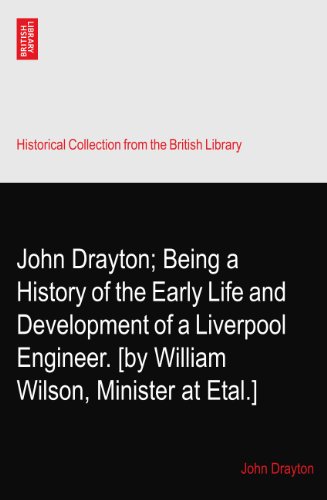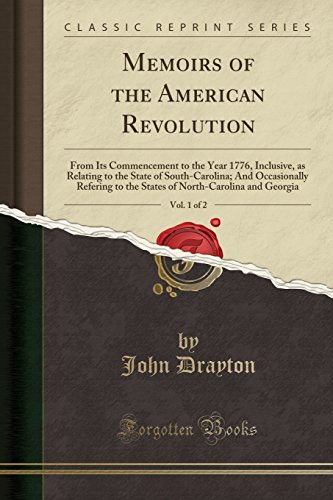Background
John Drayton was born on June 22, 1766 at “Drayton Hall, ” near Charleston, South Carolina, United States. He was the eldest child of William Henry Drayton and Dorothy Golightly.



(Mark Twain once famously said "there was but one solitary...)
Mark Twain once famously said "there was but one solitary thing about the past worth remembering, and that was the fact that it is past and can't be restored."Ê Well, over recent years, The British Library, working with Microsoft has embarked on an ambitious programme to digitise its collection of 19th century books. There are now 65,000Ê titles availableÊ (that's an incredible 25 million pages) of material ranging from works by famous names such asÊ Dickens, Trollope and Hardy as well as many forgotten literary gems , all of which can now be printed on demand and purchased right here on Amazon. Further information on The British Library and its digitisation programme can be found on The British Library website.
https://www.amazon.com/Drayton-Development-Liverpool-Engineer-Minister/dp/B003JKKSNC?SubscriptionId=AKIAJRRWTH346WSPOAFQ&tag=prabook-20&linkCode=sp1&camp=2025&creative=165953&creativeASIN=B003JKKSNC

(Excerpt from Memoirs of the American Revolution, Vol. 1 o...)
Excerpt from Memoirs of the American Revolution, Vol. 1 of 2: From Its Commencement to the Year 1776, Inclusive, as Relating to the State of South-Carolina; And Occasionally Refering to the States of North-Carolina and Georgia To Col. Daniel Stevens, for the account which Ihave given of the proceed ings of the people, after the stamped paper, had arrived in the port of Charles town. About the Publisher Forgotten Books publishes hundreds of thousands of rare and classic books. Find more at www.forgottenbooks.com This book is a reproduction of an important historical work. Forgotten Books uses state-of-the-art technology to digitally reconstruct the work, preserving the original format whilst repairing imperfections present in the aged copy. In rare cases, an imperfection in the original, such as a blemish or missing page, may be replicated in our edition. We do, however, repair the vast majority of imperfections successfully; any imperfections that remain are intentionally left to preserve the state of such historical works.
https://www.amazon.com/Memoirs-American-Revolution-Vol-South-Carolina/dp/1331352231?SubscriptionId=AKIAJRRWTH346WSPOAFQ&tag=prabook-20&linkCode=sp1&camp=2025&creative=165953&creativeASIN=1331352231
John Drayton was born on June 22, 1766 at “Drayton Hall, ” near Charleston, South Carolina, United States. He was the eldest child of William Henry Drayton and Dorothy Golightly.
Generally with his distinguished father until the last year of the latter’s life, he was placed in the Nassau Grammar School, Princeton, New Jersey, and in September 1779 entered the freshman class of the College of New Jersey.
He did not graduate from the College, but was sent to England to complete his education, probably at the Inner Temple.
In accordance with the family tradition, Drayton entered public life at an early age, serving as a member of the state House of Representatives during most of the years from 1792 to 1798, when he was elected lieutenant-governor.
Following the death of Governor Edward Rutledge on January 23, 1800, he was in charge of the executive department, though not officially recognized as governor until his election in his own right, December 4, 1800, for a term of two years.
He is said to have been the first governor to pass over the whole upper country and review the militia. Both as lieutenant-governor and governor he urged the establishment of a central institution of higher learning in order to further the political unification of the state and promote public intelligence.
Following his recommendation to the General Assembly, November 23, 1801, an act providing for the establishment of the South Carolina College (now University of South Carolina) at Columbia was passed, and approved by him on December 19.
The first meetings of the trustees were held at his home in Charleston, and he himself served as president of the Board until December 1802. The college, which was opened January 10, 1805, proved to be a potent factor in drawing together the sections of the state.
In 1807 he was among the eminent counsel who appeared before the Supreme Court of the United States in the important case, Rose vs. Himely. He served in the state Senate from 1803 to 1808, when increased representation was given the up-country and he was again elected governor for two years.
Appointed in 1812 judge of the United States court for the District of South Carolina, by President Madison, he held this post until his death in Charleston.
Early in his career Drayton published Letters written during a Tour through the Northern and Eastern States of America (1794), containing a contrast between the schools of Boston and those of South Carolina which was most unfavorable to his native state.
During his first term as governor he published A View of South Carolina, as Respects her Natural and Civil Concerns (1802), a valuable descriptive work which was probably inspired by Jefferson’s Notes on Virginia.
Late in his life appeared his Memoirs of the American Revolution, from its Commencement to the Year 1776, Inclusive; as Relating to the State of South Carolina and Occasionally Reering to the States of North-Carolina and Georgia. This useful work was based on manuscripts left by his father, but was given its form by the pen of John Drayton, who, not without vanity, allowed only his own name to appear on the title-page.
(Mark Twain once famously said "there was but one solitary...)
(Excerpt from Memoirs of the American Revolution, Vol. 1 o...)
On October 6, 1794 Drayton married Hester Rose, the daughter of Philip and Hester Rose Tidyman, who before her death in 1816 bore him six children.
